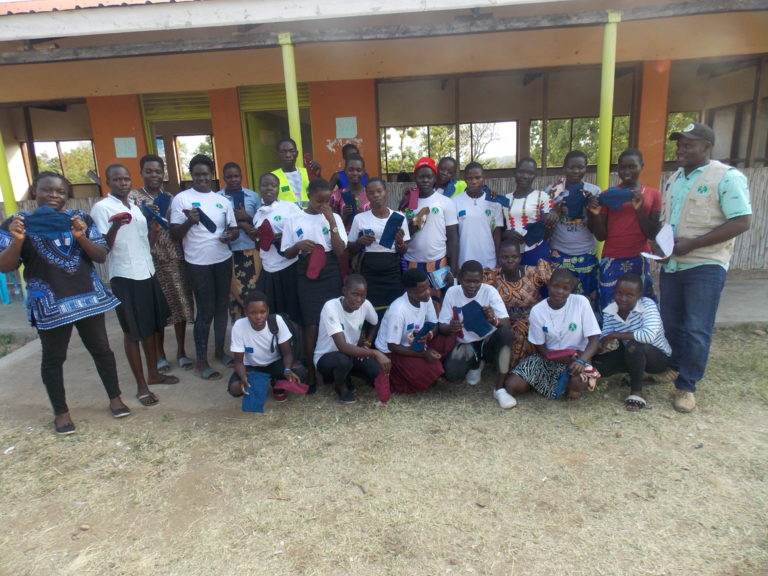Menstrual Health Management Kit Distribution
Worldwide, women and girls can often not manage their menstruation with dignity due to lack of adequate and private facilities as well as safe, acceptable and accessible menstrual health products and knowledge. These critical health challenges are further exacerbated during displacement and conflicts. In humanitarian and conflict-affected settings, menstrual health management (MHM) is often overlooked, as it is not considered urgent.
Menstruation is one of the major factors that affects school attendance among girls. They don’t only lack safe products to use, but also menstrual health knowledge and gender-specific needs for girls are overlooked, resulting in a lack of changing rooms and facilities for product disposal for girls at school. A number of UN Agencies and NGOs have implemented menstrual health interventions in different refugee settings, to ensure there is reduced gender inequalities and ensure girls stay in school, and there is growing awareness on the cross-cutting nature of MHM.
CEPADWN with funding from ECHO through Care International Uganda has implemented Menstrual Health Management by Educating and distributing B-Free cups, pants and soap to adolescent girls in Zone 3 and 4 of Imvepi refugee’s settlement
B-free Menstrual Cup
There is a lack of suitable MHM methods for women and girls in humanitarian contexts which has significant impact on their reproductive health, and more broadly, their physical, social and mental wellbeing. Menstruation is often surrounded by taboo and shame which further restricts girls and women during this natural biological process. Safe and cost-effective waste management from disposable MHM methods poses an additional challenge. The B-Free menstrual cup is increasingly being considered as a possible way to improve the MHM of women and girls in low-income contexts. The B-Free is a bell-shaped cup made of medical-grade silicone and is worn inside the vagina during menstruation to collect menstrual fluid. A B-Free can collect three times as much fluid as a tampon can absorb, poses less risk of leakage than certain other methods and can be used comfortably once the user is familiar with its use. It can be cleaned and reused for up to ten years, and the B-free cup is more cost-effective than disposable pads if used for more than 6-12 months.The B-Free menstrual cup is increasingly considered a possible solution for girls and women’s menstrual management in refugee settlement settings. The reported benefits of the B-free cup compared to other methods are reduced leaking and worries, anti-bacterial, increased comfort, wellbeing, confidence, mobility, privacy, independence as well as saving money not having to buy other products.
Project input
Over 10189 people were reached with awareness message on MHM and most especially on B-Free Menstrual cup both in Imvepi refugee settlement and Host community. The category of people include 2146 Refugee,1764 Host women, 869 Refugee Men, 600 Host men, 3042 Refugee girls,1315 Host girls, 252 Refugee boys and 194 Host girls. This was done through different means of Mass sensitizations, Door to door sensitizations, Trainings, Community Radios,
Education and Distribution of Menstrual Health Management Kit (B-free cup, soap and pants) to 3000 Girls and women in Zone 3 and 4 of Imvepi refugee settlement plus the host community in the Five (5) parishes of Odupi sub-county in Terego district.
Monitoring the use of B-free cup among girls and women in Imvepi refugee settlement and host community
Project outcome
Many girls and women positively received and are using the B-free cups in Imvepi refugees settlement and host communities
Teachers received Training are now using the skills of Menstrual Health Management in the schools to help the school going girls and the community
Girls School dropout as a result of menstrual related cases has been reduced and many have now returned to school as they now have solutions to manage menstruation in schools and the is consistence in girls’ schools attendance
Project Impacts
Menstrual Health management in the settlement and host has greatly improved as many of the girls and women are now using the knowledge they acquired during the trainings to manage menstrual related cases.
Improved knowledge and menstrual cup use. Many of the girls and women in the settlement and host are now using B-free cup to manage their menstrual hygiene management “we did not have access to materials, but now we use the Bfree cups.
Men in the settlement and host can now support the girls and women in the settlement and host “When I become a father in the future, I will have the information to help my daughter and wife while they are experiencing menstruation”
Girls School dropout as a result of menstrual related cases has been reduced and many have now returned to school as they now have solutions to manage menstruation in schools and the is consistence in girls’ schools attendance



Thanks so much Cepad wn for your interventions and pledge that in the new projects of APEAL that you will implement I wish your focus again on imvepi because no other partner has done what you did
Thanks for the feedback